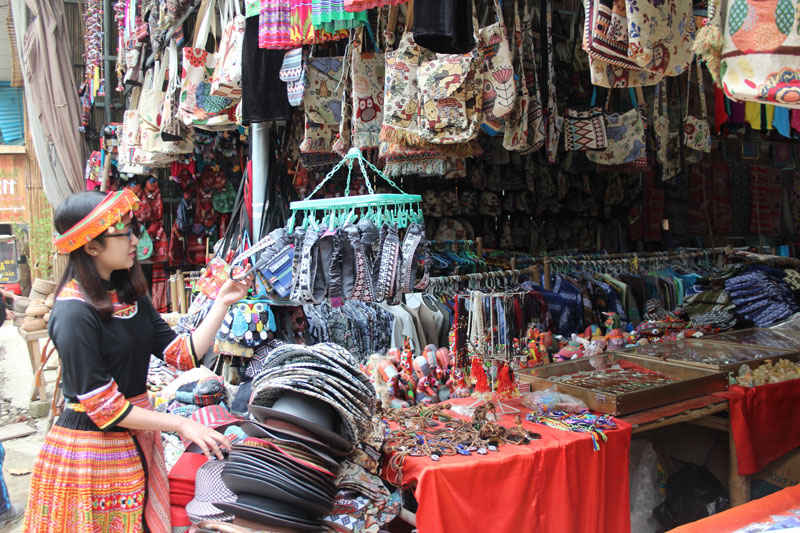
(HBO) - When the fog covering the town of Mai Chau gradually disappears, a small village with rustic houses on stilts show up, It is Pom Coong village imbued with characteristics of Thai ethnic people. Coming here, visitors can immerse themselves in the poetic natural scenery, enjoy traditional Thai ethnic food, grow rice and cook meals with ethnic people.

Tourists choose souvenirs in Pom Coong village, Mai Chau town, Mai Chau
district.
Pom Coong
means a village of hills lying on a big drum like the bronze one.
Currently,
Pom Coong is home to 70 households with 359 people and seven big families
living in harmony. Up to 89 percent of households are recognised as cultural
families. Pom Coong has been recognised as a cultural village for five
consecutive years. Local residents began providing homestay services in 1998, with
the first three families of Ha Thi Chung, Kha Van Vuong and Kha Van Hung. To
date, 15 households have engaged in this business. Up to 70 percent of visitors
are foreigners and the remaining are Vietnamese keen on Thai ethnic
characteristics. Pom Coong is attracting more and more tourists, earning locals
higher income. Last year, the village earned more than 2 billion VND from
tourism, or nearly 20 percent of the total revenue.
To lure
more visitors, local authorities and people always preserve special
characteristics of Thai ethnic culture, from stilt houses, traditional crafts
and costumes to folk dances. Thai ethnic people’s stilt houses are high, under
which, Thai young girls and women sit by the loom and weave brocade products.
Bows and
crossbows are also made available as souvenirs. When darkness falls down,
visitors could enjoy special music performances staged by local art troupes. In
the light of fire, flexible dances by beautiful Thai girls enchanted visitors.
The
village is well arranged and local residents abide by regulations of the
campaign "All people stand united to build cultural lifestyle in residential
areas”. There are not any social vices such as gambling, drug and prostitution.
Environment hygiene is ensured while garbage is classified and treated.
Chiho from
Japan said: "It is the first time I have visited
Vietnam.
Staying together with local family and joining in activities such as cycling,
rice growing, cooking ethnic food made me satisfied and impressed. Images of
Thai women next to the loom and pipe wine jar are unforgettable to me. After
returning home, I will introduce friends to Pom Coong village and return to the
village again”./.
With an increasingly vibrant and widespread emulation movement aimed at building cultured residential areas and cultured families, Yen Thuy District has been making steady progress toward improving both the material and spiritual well-being of its people, while fostering a civilized, prosperous, beautiful, and progressive community.
Once lacking recreational spaces and community facilities, Residential Group 2 in Quynh Lam Ward (Hoa Binh City) has recently received attention for the construction of a new, spacious, and fully equipped cultural house. The project followed the model of state support combined with public contributions in both labor and funding.
The "All people unite to build cultural life" movement, which has been effectively integrated with Kim Boi district’s socio-economic development goals, is fostering a lively spirit of emulation across local residential areas, hamlets, villages, public agencies, and enterprises. In addition, through the initiative, traditional cultural values are being preserved and promoted, while community solidarity and mutual support in poverty reduction and economic development are being strengthened.
A working delegation of the Hoa Binh provincial People’s Committee led by its Permanent Vice Chairman Nguyen Van Toan on June 11 inspected the progress of a project to build the Mo Muong Cultural Heritage Conservation Space linked to tourism services in Hop Phong commune, Cao Phong district.
Born and growing in the heroic land of Muong Dong, Dinh Thi Kieu Dung, a resident in Bo town of Kim Boi district, in her childhood was nurtured by the sweet lullabies of her grandmother and mother. These melodies deeply imprinted on her soul, becoming an inseparable part of her love for her ethnic group's culture. For over 20 years, this love for her hometown has driven Dung to research, collect, and pass down the cultural values of the Muong people to future generations.
In the final days of May, the Ethnic Art Troupe of Hoa Binh Province organized performances to serve the people in remote, mountainous, and particularly disadvantaged areas within the province. These were not just ordinary artistic shows, but they were the meaningful journeys aimed at spreading cultural values, enhancing the spiritual life of the people and contributing to the preservation of ethnic minority cultural identities.



